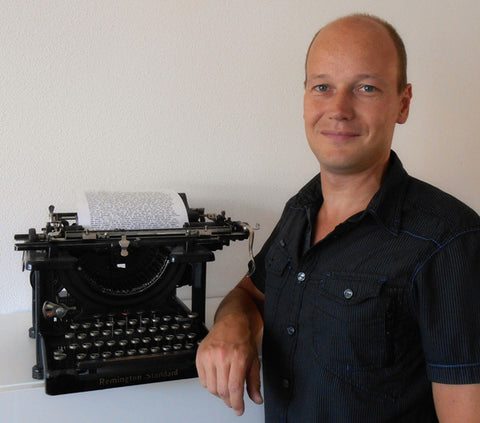This is the continuation of the Ivo Senden Freewrite Story, click here for Part 1
"It feels amazing on warm summer days to go outside, sit in the sun and the fresh air and type away. The keyboard has improved my writing speed, the distraction-free device has improved my concentration on the manuscript, and somehow it just feels wonderful to be using a beautiful, dedicated device purely for the purpose of writing." – Ivo Senden
Senden is credited with publishing the first book written partially on the Freewrite. For him, the features of the Freewrite have created a huge boost in both productivity and mood surrounding his writing. The E Ink screen is easy on his eyes, and the design of mechanical keyboard provides comfort during times when he finds flow. These were two facts that were not lost on Senden while he was researching the features of the Freewrite. He was excited to learn that the device is the only one of its kind that has an E Ink screen allowing for readability at any angle and in bright light. Senden says, "Even before I became aware of the advantages of the mechanical keyboard and the non-distraction architecture of the device, the screen alone convinced me to order a Freewrite. "
Alongside his decision to purchase the device, Senden found the Freewrite Community forum to be a particularly helpful source of information for his writing process. For him, the process of preparing to write includes a detailed outline, note taking, and intense editing which he used to do in Word. However, during his first hour of visiting the Freewrite Community Forum, he was able to interact with other writers allowing him to discover better tools to manage his content during the laborious development process.
Because the Freewrite has ergonomic features and limits the ability to get lost in social media, or other online distractions, the device allows users to write in a way that enables them to enter flow. At the end of each of his power sessions, Senden can sync his draft from cloud storage to another application for editing purposes, such as his favorite content management tool. The ability to do the bulk of his writing on the Freewrite means less time he has to spend tied to an uncomfortable laptop with short battery life.
Most importantly Senden says, "It feels amazing on warm summer days to go outside, sit in the sun and the fresh air and type away. The keyboard has improved my writing speed, the distraction-free device has improved my concentration on the manuscript, and somehow it just feels wonderful to be using a beautiful, dedicated device purely for the purpose of writing."
Simply a choice of writing location can be critical to the process of writing and to a writer's ability to achieve that all important flow. As we have learned from Senden, writing outdoors was not an option before he purchased the Freewrite. He would find himself sitting inside on his couch on a warm and sunny day. Meaning for him, a choice between work or enjoying all that a beautiful day has to offer. Now thanks to the Freewrite, he can do both which in and of itself boosts mood and creativity. Senden says, "For me, the Freewrite was the answer to my prayers for an E Ink writing device, and its magnificent keyboard was more than a huge bonus."
Ivo on His Typewriter Restoration Hobby

"The beautiful typewriter you see is 98 years old. I tracked it back to a Dutch constable who used it as early as 1919 to write his police reports. I restored it, managed to find new ink ribbons and actually even used it briefly while I was waiting for my Freewrite to arrive. You can imagine my next door neighbors weren't all too happy with some of my late night writing sessions, hacking away on this antique, mechanical monstrosity. I know for a fact that they love the Freewrite as much as I do."




















